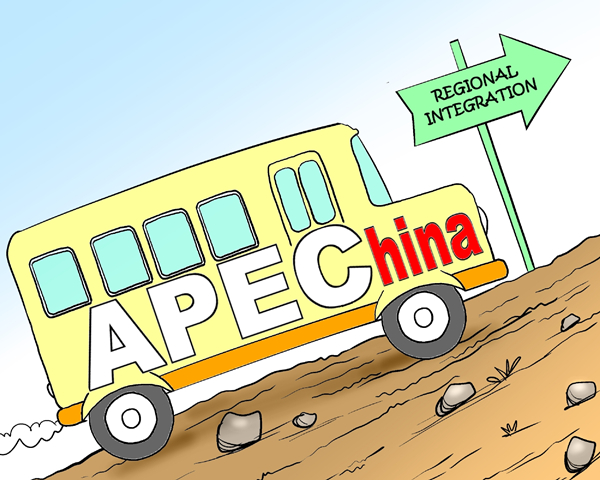China will bring 'positive energy' to APEC
- By Zhao Jianglin
 0 Comment(s)
0 Comment(s) Print
Print E-mail China.org.cn, November 9, 2014
E-mail China.org.cn, November 9, 2014
Asia-Pacific Economic Cooperation (APEC) is by far the largest and most influential regional cooperation organization in the Asia-Pacific region. Its unique status still surpasses other organizations of its kind in the region. Since its formation in 1989, and especially since the launch of the Economic Leaders' Meetings in 1993, APEC has played a remarkable role in helping China participate in the regional cooperation process. Meanwhile, as the Chinese economy grows, China is also making an increasingly significant contribution to APEC and is playing the leading role in the revival of the organization.
|
|
|
China is ready [By Jiao Haiyang/China.org.cn] |
Since becoming a member of APEC in 1991, China has contributed to the development of the organization on multiple fronts.
China is highly attentive to and proactively participates in the regional cooperation process, and promotes the integration of the Asia-Pacific region through its own active work. Since joining APEC, China has opened up more to the Asia Pacific region and the entire world, so that member economies of the region and the world can benefit from China's market opening up. China's tariff decreased from 23 percent when it joined APEC to 15 percent in 2000 and is now to less than 6 percent after several rounds of tariff reduction. China has also removed its policy restrictions in terms of non-tariff barriers, customs procedures, services and investment, in order to attract regional businesses to participate in its economic development with more transparency and fewer constraints.
On the other hand, China actively contributes its own wisdom to a series of APEC activities. Thanks to its economic growth, especially as the country became Asia's largest and the world's second largest economy in 2010, China has made a more prominent and direct contribution to APEC. Since the Chinese leader attended the APEC Economic Leaders' Meetings in 1993, China has continued to put forward constructive initiatives and has earnestly put APEC principles into practice. China has come up with a number of major polices and suggestions, including building the Asian-Pacific community, enhancing economic and technological cooperation, and promoting human resources development. Those initiatives have been recognized by APEC members and have become part of the spiritual assets of the APEC process.






